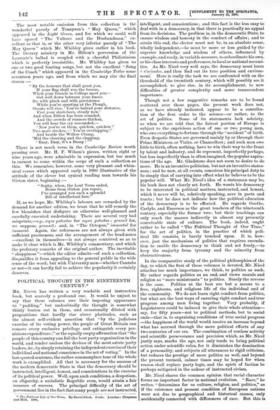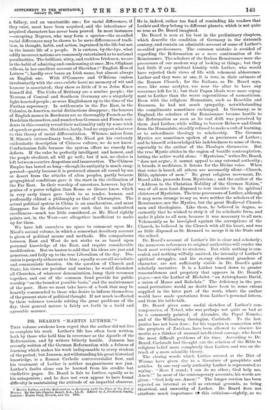POLITICAL THOUGHT IN THE NINETEENTH CENTURY.* Mn. Nrcor, has written
a very readable and instructive book, but scarcely a profound one. It would be unjust to say that these volumes owe their imposing appearance to "padding," but undoubtedly the thought is somewhat thinly beaten out in them, and occasionally diluted with propositions that hardly rise above platitudes, such as the almost self-evident assertion that "by the judicious exercise of its voting power, the people of Great Britain can remove every exclusive privilege and extinguish every per- nicious expenditure ;" or the equally empty affirmation that "the people of this country can foil the best party organisation in the world, and render useless the devices of the most astute party leaders, &c., by simply retaining the independent exercise of their individual and national conscience in the act of voting." In the last-quoted sentence, the rather commonplace tone of the whole work is exemplified. All that is necessary for the success of the modern democratic State is that the democracy should be instructed, intelligent, honest, and conscientious in the exercise of its political power. Well, upon such conditions, a despotism, an oligarchy, a socialistic Republic even, would attain a fair measure of success. The principal difficulty of the art of government lies in the fact that many people are not instructed,
• The Political Life of Our Time. By David Nicol. 2 vols. London: Chapman and Hall. 1909. intelligent, and conscientious ; and this fact is the less easy to deal with in a democracy, in that there is practically no appeal from its decisions. The problem is, in the democratic State, to ensure wisdom and honesty in the conduct of affairs; and to attain this end, the elector must not be, in an absolute sense, wholly independent, —he must be more or less guided by the superior knowledge and wisdom of others, influenced by example, and ready, in variable measure, to subordinate his own, or his class interests and preferences, to local or national necessi- ties. As Mr. Nicol very well says, the democracy must learn a s'orienter, and thus find out its true position and environ- ment. Here is really the task we are confronted with on the threshold of the twentieth century, which will possibly see it accomplished, to give rise, in its accomplishment, to new difficulties of greater complexity and more transcendent importance.
Though not a few suggestive remarks are to be found scattered over these pages, the present work does not, as we have already indicated, appear to be a contribu- tion of the first order to the science—or rather, to the art of politics. Some of its statements lack sobriety, as when we are told that the fairest portion of Europe is subject to the capricious action of one or two young men, who owe everything to fortune through the " aecident " of birth. Even despotic States are governed mainly by or through their Prime Ministers, or Vizirs, or Chancellors; and such men owe little to birth, often nothing, have to win their way to the front by talent and industry, and do represent, imperfectly perhaps, but less imperfectly than is often imagined, the popular aspira- tions of the age. Mr. Gladstone does not seem to desire to do more. He is an inventive politician, but not an inventive states- man ; and he now, at all events, conceives his principal duty to be simply that of carrying into effect what he believes to be the popular will. What Mr. Nicol's idea of a statesman may be, his book does not clearly set forth. He wants his democracy to be interested in political matters, instructed, and honest, which it never will be, relatively speaking, save in parts and tracts ; but he does not indicate how the political education of the democracy is to be effected. He regards Goethe, Carlyle, and Emerson as the great teachers of the nineteenth century, especially the former two; but their teachings can only reach the masses indirectly in almost any presently conceivable state of culture. The book, indeed, ought rather to be called "The Political Thought of Our Time," for the art of politics, in the practice of which poli- tical life consists, is barely touched upon. It is, how- ever, just the mechanism of politics that requires emenda- tion to enable the democracy to think and act freely,—to keep the majority from tyranny and the minority from obstructiveness.
In the comparative study of the political philosophies of the day, to which the first of these volumes is devoted, Mr. Nicol attaches too much importance, we think, to politics as such. He rather regards politics as an end, and views morals and religion as "mere ministrants" to politics. Surely the reverse is the case. Politics at the best are but a means to a free, righteous, and religious life of the individual and of the community. We do not learn right conduct from politics, but what are the best ways of ensuring right conduct and true progress among men living together. Very probably, if Legislatures could be induced to give their whole attention— say, for fifty years—not to political methods, but to social ends—that is, to organising conditions of true social progress —the happiness of the world would receive an increase beyond what has accrued through the mere political efforts of any two centuries of our era. The combination of restless activity and scientific perseverance and precision which, as Mr. Nicol justly says, marks the age, not only tends to bring political action under scientific rules, for it diminishes the domination of a personality, and subjects all utterances to rigid criticism, but reduces the prestige of mere politics as well, and beyond the present turmoil, calmer times may be hoped for when reason shall replace party logic, and the spirit of faction be perhaps mitigated in the ardour of instructed civism.
Mr. Nicol shares the common opinion that racial character forms an important factor in national evolution. "Race," he writes, "determines for us culture, religion, and politics," as if the existence and present condition of European nations were not due to geographical and historical causes, only accidentally connected with differences of race. But this is
a fallacy, and an unscientific one; for racial differences, if they exist, must have been acquired, aid the inheritance of acquired characters has never been proved. In most instances —excepting Negroes, who may form a species—the so-called racial differences may be shown to be mere differences of tradi- tion, in thought, habit, and action, ingrained in the life but not in the innate life of a people. It is curious, by-the-bye, what oddly incorrect notions are commonly entertained as to national peculiarities. The brilliant, witty, and reckless Irishmen, we are in the habit of admiring and condemning at once, Mrs. Oliphant tells us, in her excellent account of Sheridan (" English Men of Letters "), hardly ever bears an Irish name, but almost always an English one. With O'Connors and O'Briens (unless involuntarily with the sans-culotte hero) no memory of wit and humour is associated; they show as little of it as John Knox himself did. The Celts of Brittany are a sombre people; the Teutons of Central and Southern Germany are a singularly light-hearted people ; so were Englishmen up to the time of the Puritan supremacy. In settlements in the Far East, in the Colonies, in America, racial distinctions disappear ; the bearers of English names in Bordeaux are as thoroughly French as the Bordelais themselves, and numberless German and French resi- dents in this country reveal their nationality only by some trick of speech or gesture. Statistics, lastly, lend no support whatever to this theory of racial differentiation. Whence, unless from M. Simon's extraordinary book, Mr. Nicol got his curiously enthusiastic description of Chinese culture, we do not know. Confucianism fails because the system offers no remedy for defects. If the ruler be perfectly intelligent and honest, and the people obedient, all will go well ; but if not, no choice is left between coercive despotism and insurrection. The Chinese Empire has lasted so long—though its antiquity is much exag- gerated—partly because it is protected almost all round by sea or desert from the attacks of alien peoples, partly because geographical conditions gave it the start in the civilisation of the Far East. In their worship of ancestors, however, lay the genius of a purer religion than Rome or Greece knew, which in very early times gave birth to so tender, human, and profoundly ethical a philosophy as that of Chwangtsu. The actual political system in China is an anachronism, and must disappear, for its deficiencies are such that its undoubted excellences—much too little considered, as Mr. Nicol rightly points out, in the West—are altogether insufficient to make up for them.
We have left ourselves no space to comment upon Mr. Nicol's second volume, in which a somewhat desultory account is given of political means and methods. His comparisons between East and West do not strike us as based upon personal knowledge of the East, and require considerable modification. But we hasten to add that his ideas are just and generous, and fully up to the true Liberalism of the day. Dis- union is properly abhorrent to him ; equally so are all socialistic and communistic theories. On the question of Church and State, his views are peculiar and unwise ; he would disendow all Churches, of whatever denomination, lump their revenues together, and out of the common fund provide for public worship "on the broadest possible basis," and the maintenance of the poor. Here we must take leave of a book that may be heartily commended to those who desire to inform themselves of the present state of political thought. If not much is effected by these volumes towards solving the great problems of the day, their general nature is fairly set forth in a lucid and agreeable manner.



















































 Previous page
Previous page